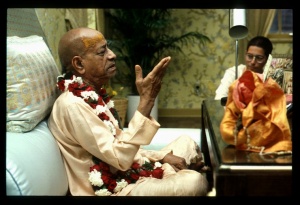CC Madhya 6.140 (1975): Difference between revisions
(Vanibot #0027: CCMirror - Mirror CC's 1996 edition to form a basis for 1975) |
(Vanibot #0020: VersionCompareLinker - added a link to the Version Compare feature) |
||
| Line 2: | Line 2: | ||
<div style="float:left">'''[[Sri Caitanya-caritamrta (1975)|Śrī Caitanya-caritāmṛta (1975)]] - [[CC Madhya (1975)|Madhya-līlā]] - [[CC Madhya 6 (1975)|Chapter 6: The Liberation of Sārvabhauma Bhaṭṭācārya]]'''</div> | <div style="float:left">'''[[Sri Caitanya-caritamrta (1975)|Śrī Caitanya-caritāmṛta (1975)]] - [[CC Madhya (1975)|Madhya-līlā]] - [[CC Madhya 6 (1975)|Chapter 6: The Liberation of Sārvabhauma Bhaṭṭācārya]]'''</div> | ||
<div style="float:right">[[File:Go-previous.png|link=CC Madhya 6.139 (1975)|Madhya-līlā 6.139]] '''[[CC Madhya 6.139 (1975)|Madhya-līlā 6.139]] - [[CC Madhya 6.141 (1975)|Madhya-līlā 6.141]]''' [[File:Go-next.png|link=CC Madhya 6.141 (1975)|Madhya-līlā 6.141]]</div> | <div style="float:right">[[File:Go-previous.png|link=CC Madhya 6.139 (1975)|Madhya-līlā 6.139]] '''[[CC Madhya 6.139 (1975)|Madhya-līlā 6.139]] - [[CC Madhya 6.141 (1975)|Madhya-līlā 6.141]]''' [[File:Go-next.png|link=CC Madhya 6.141 (1975)|Madhya-līlā 6.141]]</div> | ||
{{CompareVersions|CC|Madhya 6.140|CC 1975|CC 1996}} | |||
{{RandomImage}} | {{RandomImage}} | ||
==== TEXT 140 ==== | ==== TEXT 140 ==== | ||
| Line 11: | Line 10: | ||
<div class="verse"> | <div class="verse"> | ||
:sarvaiśvarya-paripūrṇa svayaṁ bhagavān | :sarvaiśvarya-paripūrṇa svayaṁ bhagavān | ||
:tāṅre nirākāra | :tāṅre nirākāra kari' karaha vyākhyāna | ||
</div> | </div> | ||
| Line 18: | Line 17: | ||
<div class="synonyms"> | <div class="synonyms"> | ||
sarva-aiśvarya-paripūrṇa—full with all opulences; svayam—personally; bhagavān—the Supreme Personality of Godhead; tāṅre—Him; nirākāra—impersonal; | sarva-aiśvarya-paripūrṇa—full with all opulences; svayam—personally; bhagavān—the Supreme Personality of Godhead; tāṅre—Him; nirākāra—impersonal; kari'-making; karaha—you make; vyākhyāna—explanation. | ||
</div> | </div> | ||
| Line 25: | Line 24: | ||
<div class="translation"> | <div class="translation"> | ||
"Actually, the Supreme Absolute Truth is a person, the Supreme Personality of Godhead, full with all opulences. You are trying to explain Him as impersonal and formless. | |||
</div> | </div> | ||
| Line 32: | Line 31: | ||
<div class="purport"> | <div class="purport"> | ||
Brahman means bṛhattva, the greatest of all. The greatest of all is Śrī Kṛṣṇa, the Supreme Personality of Godhead. He possesses all potencies and opulence in full; therefore the Absolute Truth, the greatest of all, is the Supreme Personality of Godhead. Whether one says | Brahman means bṛhattva, the greatest of all. The greatest of all is Śrī Kṛṣṇa, the Supreme Personality of Godhead. He possesses all potencies and opulence in full; therefore the Absolute Truth, the greatest of all, is the Supreme Personality of Godhead. Whether one says "Brahman" or "the Supreme Personality of Godhead," the fact is the same, for they are identical. In the Bhagavad-gītā, Arjuna accepted Kṛṣṇa as paraṁ brahma paraṁ dhāma. Although the living entities or material nature are sometimes described as Brahman, Paraṁ Brahma-the Supreme, the greatest of all Brahmans-is still Kṛṣṇa, the Supreme Personality of Godhead. He is full with all opulences, and as such He possesses all riches, all strength, all reputation, all knowledge, all beauty and all renunciation. He is eternally a person and eternally supreme. If one tries to explain the Supreme impersonally, one distorts the real meaning of Brahman. | ||
</div> | </div> | ||
Latest revision as of 18:33, 27 January 2020

A.C. Bhaktivedanta Swami Prabhupada
TEXT 140
- sarvaiśvarya-paripūrṇa svayaṁ bhagavān
- tāṅre nirākāra kari' karaha vyākhyāna
SYNONYMS
sarva-aiśvarya-paripūrṇa—full with all opulences; svayam—personally; bhagavān—the Supreme Personality of Godhead; tāṅre—Him; nirākāra—impersonal; kari'-making; karaha—you make; vyākhyāna—explanation.
TRANSLATION
"Actually, the Supreme Absolute Truth is a person, the Supreme Personality of Godhead, full with all opulences. You are trying to explain Him as impersonal and formless.
PURPORT
Brahman means bṛhattva, the greatest of all. The greatest of all is Śrī Kṛṣṇa, the Supreme Personality of Godhead. He possesses all potencies and opulence in full; therefore the Absolute Truth, the greatest of all, is the Supreme Personality of Godhead. Whether one says "Brahman" or "the Supreme Personality of Godhead," the fact is the same, for they are identical. In the Bhagavad-gītā, Arjuna accepted Kṛṣṇa as paraṁ brahma paraṁ dhāma. Although the living entities or material nature are sometimes described as Brahman, Paraṁ Brahma-the Supreme, the greatest of all Brahmans-is still Kṛṣṇa, the Supreme Personality of Godhead. He is full with all opulences, and as such He possesses all riches, all strength, all reputation, all knowledge, all beauty and all renunciation. He is eternally a person and eternally supreme. If one tries to explain the Supreme impersonally, one distorts the real meaning of Brahman.